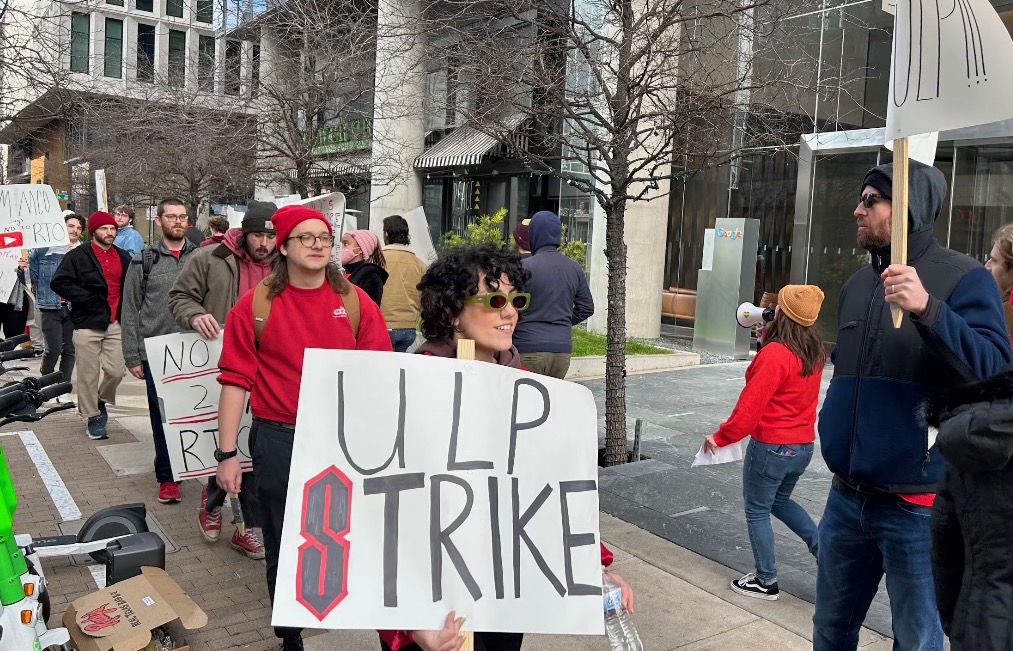by Joshua F
In a surprisingly fast finding, the striking workers at YouTube Music in Austin won the first round in the case that they are joint employees of both Google (which owns YouTube) and its subcontractor, Cognizant. The National Labor Relations Board, the federal body which hears these cases, ruled March 3 in the workers’ favor. The NLRB has been deliberately underfunded for years to prevent workers from using legal rights we have won in the past so the speed is remarkable.
Katie Marschner, Subject Matter Expert on the charts team at YouTube Music and a principal organizer of their union, thinks it’s because of the strike that the case was decided so quickly. “If a group of workers submits a ULP [unfair labor practice charge – ed.] and then goes on strike, it becomes more serious to them since they want to resolve that strike.” In addition to the petition for a union election with the joint Google-Cognizant employer, the YouTube Music workers have filed a ULP charge and are striking against the employer for changing work conditions after the petition was filed. [See strike article in Red Fault]
Marschner and her coworkers feel they had a particularly strong case for a joint-employer case. “Cognizant provides our web clock we use to clock in and clock out. That’s all of their involvement in our day-to-day work. Everything else comes from Google: Google sets minimum pay and benefits; we follow Google’s holiday schedule; our work is passed onto us directly from full-time Google employees; Google is in charge of quality assessment of our work; we do Google’s security and ethics training and Google’s compliance checks.
“We knew filing that way [for a joint employer] would create a lot of delays but decided that if we won an election with just Cognizant as the employer, they would be able to use Google as a scapegoat, saying ‘your pay is dictated by Google so we can’t negotiate over that’ or ‘work in the office is a Google decision and we can’t bargain over that.’ In the long run, it would be better for bargaining.
“The NLRB uses eight categories to determine joint employers. They ruled in favor of joint status based on supervision, direction of work, hours of work and benefits (they were neutral on the question of pay) and so ruled in our favor.
“They also ruled in our favor on Subject Matter Experts who the company was trying to exclude from the union. The NLRB said Subject Matter Experts don’t meet the standard of being a manager and should be part of the union.”
Google has appealed, but this is a solid first-round win for the workers.
Major Precedent
The importance of this case extends far beyond Cognizant, Google and Alphabet (Google’s parent company.) Marschner stressed that “this sets a major precedent. Many gigantic tech companies use this business model to make their shareholders happy and make it appear like they have fewer employees than they do to avoid legal responsibility over people. Half of Google’s workforce are TVCs (Tech Vendor Contract workers). We knew this would be a tough decision for the NLRB to make. This doesn’t just affect Google: Facebook uses TVCs, Twitter, every massive tech company uses this business model to exploit workers.”
The Strike
The workers continue their strike. The reason for the strike, Marschner explained, is that “two weeks after we filed for the election, Cognizant sent us a return to office notice. We filed an unfair labor practice charge because it was a retaliation for our efforts to unionize. About a quarter of our staff lives out of state or out of town. Others care for elderly family or small children or spouses with illnesses that require around the clock care. It [the return-to-office order] was an effort by Cognizant to cool our union efforts and to separate us. We had to go on strike to protect jobs for those people.”
However, for both strategic and financial reasons, the union members made the decision to send some people back into the office on February 27. Marschner explained that Cognizant was “hiring like crazy while we were all out so we knew there was a new batch of people we would have to organize.”
Marschner added one other sleazy tactic to the companies’ union busting efforts. “They hired 35 agents in India when we went on strike. What’s so gross about all of this is that they are requiring the agents in India to go to an office as well and a lot of them, it might be 30 hours travel on a train or a bus to work two days a week in an office for no reason and at the end of it, they’re going to get laid off from this project if the NLRB rules this was an unfair labor practice.”
It is encouraging to hear the concern from her and other workers here for their counterparts around the globe. Often in the past, workers in the US and other developed countries have seen members of the working class in other countries as enemies when used against them by employers. It speaks highly of the US Cognizant/Google workers that they feel empathy rather than hostility for their colleagues across the ocean.
Marchner added that the companies’ efforts to hire scabs weren’t limited to overseas, but have seemed quite incompetent. “They were also trying to hire people in the US. I got hit up by one of Cognizant’s recruiters offering me $15 more an hour than I currently make. People have been back in the office for a week now and from what we can tell, the drive to hire Austin-based workers was not successful – we haven’t seen any new people in the office or any of our work chat spaces.”

